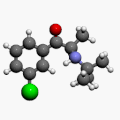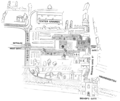Tobias Barreto
The Psychiatry Portal Psychiatry is the medical specialty devoted to the diagnosis, treatment, and prevention of deleterious mental conditions. These include matters related to cognition, perceptions, mood, emotion, and behavior. Initial psychiatric assessment of a person begins with creating a case history and conducting a mental status examination. Laboratory tests, physical examinations, and psychological tests may be conducted. On occasion, neuroimaging or neurophysiological studies are performed. Mental disorders are diagnosed in accordance with diagnostic manuals such as the International Classification of Diseases (ICD), edited by the World Health Organization (WHO), and the Diagnostic and Statistical Manual of Mental Disorders (DSM), published by the American Psychiatric Association (APA). The fifth edition of the DSM (DSM-5) was published in May 2013. (Full article...) Selected article  Clinically, bupropion serves as an atypical antidepressant fundamentally different from most commonly prescribed antidepressants such as selective serotonin reuptake inhibitors (SSRIs). It is an effective antidepressant on its own, but is also popular as an add-on medication in cases of incomplete response to first-line SSRI antidepressants. In contrast to many other antidepressants, it does not cause weight gain or sexual dysfunction. The most important side effect is an increase in risk for epileptic seizures, which caused the drug to be withdrawn from the market for some time and then caused the recommended dosage to be reduced. (Full article...) Selected image image credit: public domain
WikiProjectsSelected biography The central concept of analytical psychology is individuation—the psychological process of integrating the opposites, including the conscious with the unconscious, while still maintaining their relative autonomy. Jung considered individuation to be the central process of human development. Jung created some of the best known psychological concepts, including the archetype, the collective unconscious, the complex, and synchronicity. The Myers-Briggs Type Indicator (MBTI), a popular psychometric instrument, was developed from Jung's theory of psychological types. Jung saw the human psyche as "by nature religious" and made this religiousness the focus of his explorations. Jung is one of the best known contemporary contributors to dream analysis and symbolization. Though he was a practising clinician and considered himself to be a scientist, much of his life's work was spent exploring tangential areas such as Eastern and Western philosophy, alchemy, astrology, and sociology, as well as literature and the arts. Jung's interest in philosophy and the occult led many to view him as a mystic, although his ambition was to be seen as a man of science. His influence on popular psychology, the "psychologization of religion", spirituality and the New Age movement has been immense. (Full article...) General imagesThe following are images from various psychiatry-related articles on Wikipedia.
Related portalsTopicsSubcategoriesAssociated WikimediaThe following Wikimedia Foundation sister projects provide more on this subject:
Discover Wikipedia using portals |

 Read
Read
 AUTHORPÆDIA is hosted by Authorpædia Foundation, Inc. a U.S. non-profit organization.
AUTHORPÆDIA is hosted by Authorpædia Foundation, Inc. a U.S. non-profit organization.
































